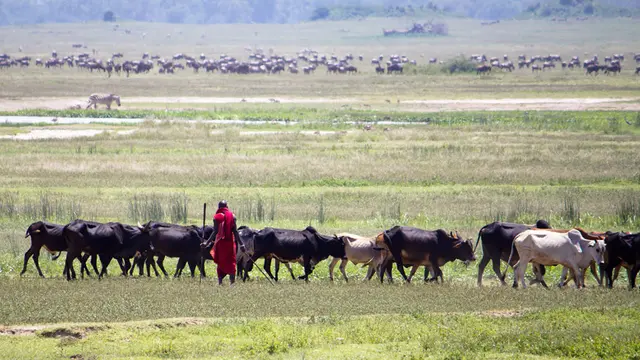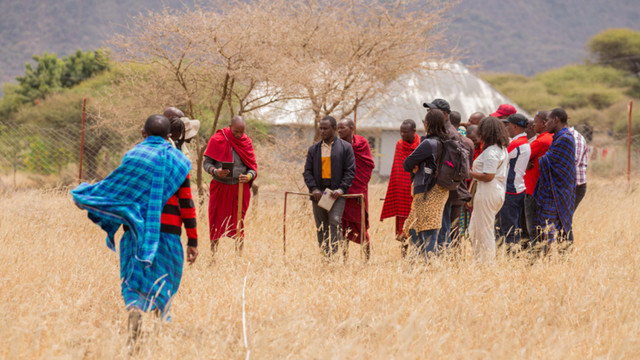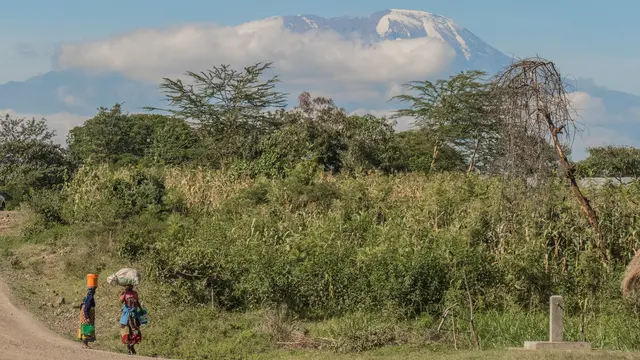Global leaders must not neglect the world's poor and vulnerable
Delegates from CBA9 today (30 April) called on developed nations to step up support for vulnerable countries to help them meet ambitious goals for climate change adaptation. The conference declaration says the 2015 global agenda has the potential to deliver real change by empowering communities to build a more resilient future.

The Nairobi Declaration will be taken to this year's UN Climate Change Conference of the Parties (COP21) by Fatima Mohamed Hussein, on behalf of the Kenyan government, the conference hosts (Photo: Matt Wright/IIED)
As the 9th International Conference on Community-Based Adaptation to Climate Change (CBA9) closes in Nairobi, Kenya, more than 400 delegates from 90 countries have called on world leaders to address the needs of the world's poorest and most vulnerable in 2015's series of high-level environment and development summits.
From April 27-30, representatives from governments, civil society, the scientific community, and international and non-governmental organisations gathered at CBA9.
The CBA9 participants present the Nairobi Declaration (PDF), which will be taken to Paris at this year's UN Climate Change Conference of the Parties (COP21) by Fatima Mohamed Hussein, National Climate Change Secretariat, Ministry of Environment, Water and Natural Resources on behalf of the Kenyan Government, which hosted this year's conference.
The conference was organised by The African Centre for Technology Studies (ACTS) jointly with the Government of Kenya (GOK), International Institute for Environment and Development (IIED) and the Bangladesh Centre for Advance Studies (BCAS).
Saleemul Huq, IIED senior fellow and director of ICCCAD, said: "The poorest and most vulnerable communities are disproportionately affected by climate change and this will continue unless the world's leaders make every effort to truly prioritise their needs in 2015's high-level summits."
Several summits on the global agenda this year have the potential to deliver real change and empower the communities that need this vital support. Politicians and leaders will meet to draft agreements on Sustainable Development Goals, Financing for Development and Climate Change under the UN Framework Convention on Climate Change (UNFCCC).
Huq added: "Participant-led initiatives like CBA9 show the level of initiative that is taking place on a community level and up in vulnerable countries when it comes to adapting to and enhancing their resilience to climate change. They now need developing countries to go one step further in supporting them to meet their ambitious plans."
The Nairobi Declaration is drawn from the participants' discussions, lessons learned and outcomes of this conference, and builds on the recommendations from last year's Kathmandu Declaration agreed at CBA8.
The delegates reiterated the vital need to secure additional, adequate and transparent funds for adaptation, with an emphasis on supporting community-level efforts, which can be overlooked when funding is managed centrally.
Interviews:
To arrange an interview with CBA9 delegates, speakers and organisers please contact:
Millie Mwango, African Centre for Technology Studies (ACTS): M.Mwango@acts-net.org
Katharine Mansell, IIED: katharine.mansell@iied.org
1. The panel presiding over the closing plenary session for CBA9 included:
- George Mwaniki, senior research fellow, ACTS
- Tom Owiyo, principal economist, African Development Bank Group
- Edith Adera, senior program specialist, IDRC
- Saleemul Huq, IIED senior fellow and director of ICCCAD
- Victor Orindi, National Drought Management Authority


